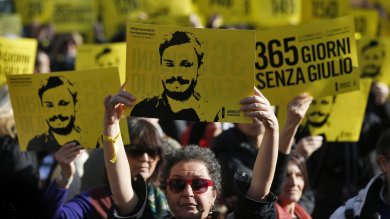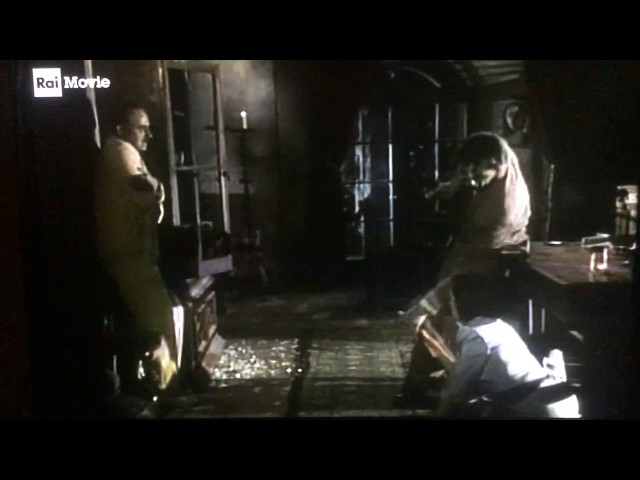
Of Arab Springs turned dictatorships, state tortures and murders, commercial bonds over human life:
one year after, we don’t have to live and let Giulio die.
Shocked, outraged, bewildered, overwhelmed:
that’s how I feel today, on the sixth anniversary of a revolution (the Egyptian Arab Spring) turned fascist dictatorship and on the first anniversary of Giulio Regeni’s alleged brutal state torture and murder.
Giulio Regeni was a Cambridge PhD student who had lived in Cairo for some months before he was killed; he was there because he was collecting information for his doctoral dissertation on the Egyptian workers’ unions. Allegedly, he was considered a foreign spy and arrested, tortured to death by Egypt’s secret services, a destiny shared by thousands of Egyptian non-orthodox thinking citizens under Sisi’s Pinochet-style dictatorship which came to power with a golpe, a tyranny which seems to live in terror of the crowd.
To normal people, Giulio Regeni’s case, I mean what happened to him, could already be guessed easily the day after his murder: the ‘vaporizing’ of inconvenient citizens – the desaparecidos – is a procedure we’ve seen so many times in Argentina, Chile and the likes. What is shocking is the ambiguous – to say the least – attitude of the Italian government, declaring his determination in searching for the truth but actually moving with feet of lead. My feeling is that the Italian magistracy’s investigation has been carried on restlessly in its attempt to break the wall of silence of the Egyptian authorities and to get rid of all the offensive attempts of depistaggi (false tracks), some of them even naïve, made up by Egyptian officials, like our deviati (corrupt) secret services have done throughout the course of our republican life (the given out motives – the road accident, the robber gang, the row in the gay milieu – were all attempts to hide the truth). And that restlessness has been quite disturbing to the Italian government in its attempt to mediate.
Today the moral minority of Italy has organized a much deserved series of demonstrations and events to celebrate this sad anniversary, and throughout the year their engagement in keeping attention high has helped not to let this case slip into oblivion even at an international level. Not to say of Giulio Regeni’s parents who have given a fundamental contribution to the cause with dignity and civility, a lesson of engagement and balance almost unbelievable under those circumstances, after they had to identify formally the horribly mutilated corpse of their son, almost unrecognizable after the series of tortures he was submitted to.
The Egyptian Arab Spring’s failure is now an historical fact, the glorious days of Tahrir Square in 2011 buried by Sisi’s military coup in 2013, a full mode restoration that has re-established, and maybe worsened, the initial situation. The ‘Thought Police’ of Orwellian memory, the use of tortures we saw in the Bush-Cheney age of the War on Terror, are now there, facing us, brought to limelight by Giulio Regeni’s case. No doubt the stretching of time is the technique chosen by the regime to let the truth fade away and memory slip into oblivion, and the ambiguity of the Italian government is a factor they count on.
Here is the rub: as A. Stille wrote in his reportage Who Murdered Giulio Regeni? … concerns of state – the close relations between two nations, billions of dollars of commercial ties – should count more than the life of one person, who had been killed by mistake. They [the Egyptians] seemed to find it impossible to understand that the Italian government would have to account to public opinion and could not, even if it had wanted to, accept a flimsy, implausible account of Regeni’s death.
Here we go again with the usual dirge of business relationships and commercial bonds which are more important than human life, human rights, civil liberties. It is a recurring litany that suggests a lot about the funding values of Western democracy. Un anno dall’orribile uccisione di Giulio Regeni. Vicinanza alla famiglia. Impegno con la magistratura per ottenere la verità the Italian Prime Minister Gentiloni tweeted us yesterday. Does he mean it too?
The attitude of Cambridge University, their refusal to be involved and to collaborate with the Italian authorities, smells of omertà as well. All these omertosi behaviours remind me of the topical song Who killed Davey Moore by Bob Dylan, an early 60s tune on the death of the famous boxer on the ring. No one is responsible – neither the referee nor the angry crowd, his manager, the gambling man, the boxing writer, the man whose fists laid him low in a cloud of mist; they all say: “It wasn’t me that made him fall / No, you can’t blame me at all”. So, Who killed Davey Moore / Why an’ what’s the reason for? … Don’t say ‘murder’, don’t say ‘kill’. It was destiny, it was God’s will. Isn’t it like that for Giulio Regeni too?
Free independent investigative journalism is the most feared weapon for any regime and a strong tool in the hands of democracy. So my call to action to the voluntary reader is to read or listen to Who Murdered Giulio Regeni?, the exhaustive The Guardian reportage that traces the story so far. You may also want to watch the comprehensive TV reportage Chi ha ucciso Giulio Regeni? – in Italian, broadcast for the occasion by RAI 3 – by the daring journalist Giulia Bosetti who followed Giulio’s route in Egypt, a very risky business in the name of truth.
Because we don’t have to live and let him die.


